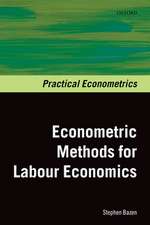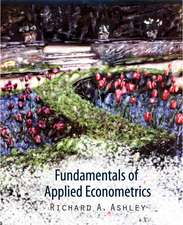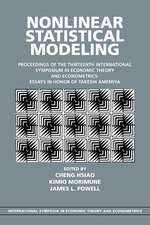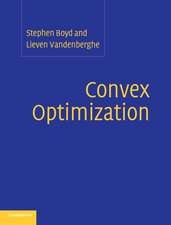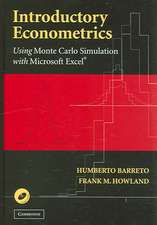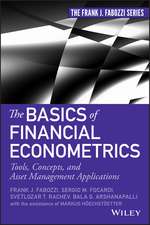Dynamic Economic Analysis: Deterministic Models in Discrete Time
Autor Gerhard Sorgeren Limba Engleză Paperback – 11 feb 2015
Preț: 370.82 lei
Nou
Puncte Express: 556
Preț estimativ în valută:
70.96€ • 75.88$ • 59.16£
70.96€ • 75.88$ • 59.16£
Carte tipărită la comandă
Livrare economică 18 aprilie-02 mai
Preluare comenzi: 021 569.72.76
Specificații
ISBN-13: 9781107443792
ISBN-10: 1107443792
Pagini: 304
Ilustrații: 30 b/w illus.
Dimensiuni: 188 x 244 x 15 mm
Greutate: 0.64 kg
Editura: Cambridge University Press
Colecția Cambridge University Press
Locul publicării:New York, United States
ISBN-10: 1107443792
Pagini: 304
Ilustrații: 30 b/w illus.
Dimensiuni: 188 x 244 x 15 mm
Greutate: 0.64 kg
Editura: Cambridge University Press
Colecția Cambridge University Press
Locul publicării:New York, United States
Cuprins
Preface; Part I. Difference Equations: 1. Basic concepts; 2. Linear difference equations; 3. Autonomous difference equations; 4. One-dimensional maps; Part II. Dynamic Optimization: 5. Optimization techniques; 6. Dynamic inconsistency and commitment; 7. Dynamic games; 8. Dynamic competitive equilibrium; References; Index.
Recenzii
'This book offers a comprehensive vision of economic dynamics suitable for graduate students and professionals alike. Gerhard Sorger is a leading researcher with a flair for presenting mathematically challenging theories carefully and rigorously. His text emphasizes the interplay between formal theory and applications with detailed developments of a catalogue of economic models and examples drawn from macroeconomics, growth theory and game theory. There is no other single book readily accessible in the economics literature covering the same wide range of deterministic dynamics and optimization theories with detailed illustrations of those theories in action. It is accessible to students engaged in a self-study program for students engaging with dynamical systems for the first time. Better yet, it offers the topics and treatments for a course in dynamics.' Robert A. Becker, Indiana University, Bloomington
'This is a beautifully written book, providing a completely self-contained introduction to dynamic economic methods and models for graduate students in economics. The masterly exposition strikes a perfect balance between a user-friendly approach and a completely rigorous presentation of the subject matter. The style of writing is marked by exceptional clarity, very much in keeping with the high standards set by the author in his research contributions. The book is neatly divided into two parts, the first providing a comprehensive account of the theory of dynamical systems, and the second the theory and applications of dynamic optimization in settings with single and multiple decision makers. The chapters on Autonomous Difference Equations and Optimization Techniques are real gems, and should form the core material in any course on dynamic economic analysis.' Tapan Mitra, Goldwin Smith Professor of Economics, Cornell University
'Up to now, there are very few books available at the graduate level that introduce the necessary mathematical techniques to study macroeconomics from the viewpoint of nonlinear dynamics. Gerhard Sorger is one of the few theorists who have made profound contributions to the subject. His book beautifully introduces the basic results and synthesizes the latest developments in the discrete time nonlinear growth models. This book is ideally suited as a textbook for graduate courses in macroeconomics and mathematical economics. Gerhard Sorger should be congratulated on his efforts to educate young researchers. I highly recommend this book.' Kazuo Nishimura, RIEB, Kobe University
'This is a beautifully written book, providing a completely self-contained introduction to dynamic economic methods and models for graduate students in economics. The masterly exposition strikes a perfect balance between a user-friendly approach and a completely rigorous presentation of the subject matter. The style of writing is marked by exceptional clarity, very much in keeping with the high standards set by the author in his research contributions. The book is neatly divided into two parts, the first providing a comprehensive account of the theory of dynamical systems, and the second the theory and applications of dynamic optimization in settings with single and multiple decision makers. The chapters on Autonomous Difference Equations and Optimization Techniques are real gems, and should form the core material in any course on dynamic economic analysis.' Tapan Mitra, Goldwin Smith Professor of Economics, Cornell University
'Up to now, there are very few books available at the graduate level that introduce the necessary mathematical techniques to study macroeconomics from the viewpoint of nonlinear dynamics. Gerhard Sorger is one of the few theorists who have made profound contributions to the subject. His book beautifully introduces the basic results and synthesizes the latest developments in the discrete time nonlinear growth models. This book is ideally suited as a textbook for graduate courses in macroeconomics and mathematical economics. Gerhard Sorger should be congratulated on his efforts to educate young researchers. I highly recommend this book.' Kazuo Nishimura, RIEB, Kobe University
Notă biografică
Descriere
Concise yet rigorous, this textbook provides a clear and systematic introduction to the theory and application of dynamic economic models.

